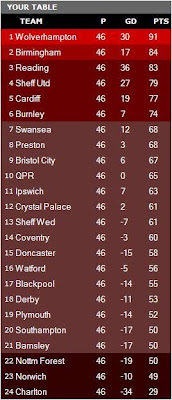Warts 'n all
If The Damned United book is clearly detrimental to the memory of Brian Clough, as well as the likes of Don Revie, Billy Bremner and, in the first editions only, Johnny Giles, painting Mr Clough as an alcoholic, chain smoking his way through trying to restructure of what was a very successful Leeds side, the ITV documentary chose to show the softer, family orientated side to the man.
The Leeds players came out of the documentary certainly better than they do in the book. I can understand both sets of opinions, but it’s hard not to side with the man that won European trophies while Leeds sunk to the second division for the best part of the next decade.
The documentary, like the book, interwove current events, Brian Clough’s induction into the EUFA Hall of Fame, with flash backs of his time at Derby, Leeds and the initial successful period at Forest. The back drop to the story was talking heads from former players and, to completely blow the David Peace book & film out of the water, the Clough family themselves.
It was clear what the documentary was trying to say, Brian Clough wasn’t just a successful football manager, he was also a husband, a father, a grand-father.
But while the book is harsh on the Clough memory, the ITV documentary chose to gloss over the less successful aspects of Clough’s personality. His fall-out with Peter Taylor dismissed without any explanation or in-depth analysis as to how that effected his other, more public, demon, alcohol. The drinking was similarly dismissed, Sir Geoffrey Boycott, a similarly bluff talking Yorkshire man, the only person to mention IT.
And then IT was gone. A couple of shots of a clearly shaking Clough at the end of a game the only indication of the down-fall to come.
But why gloss over the latter periods of his Forest reign ? Sure, even Stevie Wonder would have seen what was coming at the end of the 92/93 season, Clough’s ability to pick a player having deserted him and with our two most creative players, Clough jnr & Roy Keane playing in defence. But the vast majority of Forest fans celebrated that relegation, Clough was awarded the freedom of Nottingham during that free-fall period, the reaction from the Sheffield United fans in the game that sealed our fate, all positive things.
The team Clough created in the late eighties, all without Taylor, was in my opinion better than that of the late seventies. The record books might record an FA Cup final & two semi-finals, two League Cup wins, a couple of Simod Cup thingies, but what it won’t properly portray is the style of that team which, on it’s day, was capable of beating anyone. In a stark warning of the future for Forest, and other clubs, Neil Webb’s financially motivated move away from a better placed Forest team to a Man United team staving off relegation stopped Forest moving beyond from their third place league finish. It’s still my feeling that had Webb stayed, we’d have challenged for the league the season after he went rather than a repeat of that third place spot.
Clough’s battle with liver disease, a battle he played out less publicly, more successfully and with a damn sight more respect than George Best ever mustered didn’t get a mention, the documentary jumping to the unveiling of the Brian Clough statue just off the Market Square, flashing back to the same location, different scenes from 30 years earlier as the victorious European Cup winners came home. I was there for both occasions and I’m not ashamed to say that during the documentary I shed a couple of tears, tears of remembrance for a man who has brought me so much pleasure, tears for a time that will never return and tears for the memories that it was my dad that had taken me to the Square all those years ago, completing the family theme.
While it’s never a chore to watch Brian Clough talking, and the documentary last night had plenty of examples, it would have been nice to have had a definitive telling of the whole story, start to finish, not just a family's right to reply to a fictional book.























